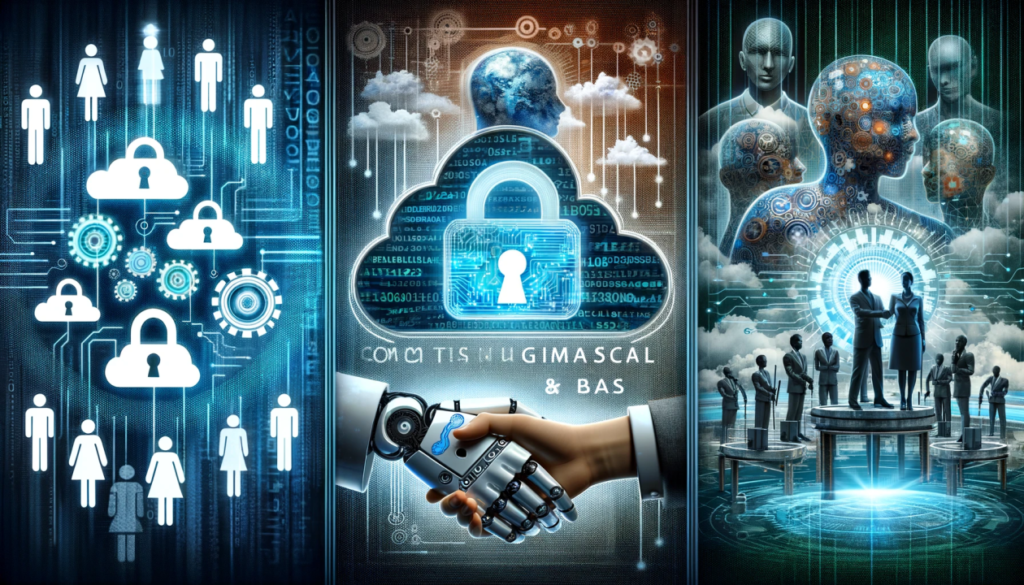Personal data protection has become more critical than ever in today’s digital landscape, owing to ethical and social issues in information systems. The increasing interconnectedness of our lives through technology necessitates a heightened awareness of data privacy. Your digital footprint, composed of online interactions and transactions, is valuable. However, it’s equally susceptible to exploitation, making the protection of personal boundaries imperative.
Data privacy is not confined to online transactions; it permeates personal information across digital platforms. Every click adds to an expanding data pool, requiring individuals to grasp its significance. In the information age, privacy breaches can result in identity theft, financial loss, or psychological distress. Safeguarding personal information becomes a necessity to preserve the digital fabric of society. The human dilemma lies in reaching a delicate compromise between the convenience of digital interactions and the imperative to protect one’s digital identity in this information age.
Understanding Algorithms: The Power Behind the Screen

Learning about the complex nature of algorithms discloses the formidable force that shapes our digital experiences. Behind the sleek screens and interactive interfaces lies a complex world governed by algorithms—a silent but powerful orchestrator of our online interactions. These digital decision-makers dictate what content we see, the ads that target us, and even influence the information we consume.
Predictive Algorithms operate on vast datasets, employing mathematical formulas to make predictions and decisions. As users, we often witness their effects without fully comprehending the criteria they use. Whether it’s personalized recommendations on streaming platforms or targeted advertising on social media, algorithms are the silent architects molding our online reality.
However, with this power comes a pressing concern: algorithmic accountability. As we rely more on automated systems to curate our digital experiences, questions of transparency, bias, and ethical considerations emerge. Awareness of algorithms empowers users to question, critique, and advocate for responsible practices in our digital world.
Social Media and Mental Well-being:

The dominant existence of social media in our lives brings both connectivity and a potential impact on mental well-being. In the age of constant connectivity, platforms like Facebook, Instagram, and Twitter serve as virtual meeting places where individuals share their lives, opinions, and experiences. While this stimulates community and facilitates communication, the flip side reveals a tricky association between social media use and mental fitness.
Social media builds support and connection but also brings challenges. The curated online image and quest for validation can induce feelings of inadequacy. The constant influx of information, laden with societal pressures, contributes to information overload and negatively affects mental well-being.
Closing the Digital Gap: Access for All

Closing the digital divide is essential when tackling ethical and social issues in information systems in the ever-changing landscape of technological advancements. The digital divide refers to the contrasts in access to and usefulness of information and communication technologies. While the world becomes more interconnected through digital innovation, a significant portion of the global population still faces challenges accessing these technologies.
Ensuring access for all is about bridging the gap in internet connectivity and addressing disparities in digital literacy and technological resources. As we advance into an era where online presence is integral to education, job opportunities, and civic participation, leaving segments of society behind in the digital realm raises ethical concerns.
The digital gap exacerbates existing social inequalities, hindering individuals from fully participating in the benefits of the digital age. Bridging this divide requires not only infrastructural improvements but also initiatives that promote digital literacy and inclusivity.
Big Tech Influence: Shaping Our World

The impact of big tech companies is felt in almost every part of our lives due to the massive expanse of technology. From shaping online experiences to driving innovation, Big Tech plays a pivotal role in shaping the trajectory of our digital world. As these giants amass immense power, ethical and social issues emerge.
Big Tech firms shape information flow, digital communication, and societal norms. Their decisions impact content and algorithms, raising concerns about accountability and transparency. Privacy breaches, market monopolies, and potential data misuse underscore ethical challenges. Balancing innovation and regulation is crucial to aligning Big Tech’s influence with ethical principles and societal interests.
Counteracting Security and Privacy in the Digital Age:

In the era of technological progress, the symbiotic relationship between security and privacy takes center stage. As we advance in the digital age, safeguarding sensitive information clashes with the need for robust protection. Striking the right balance is crucial for preserving the integrity of digital interactions without compromising privacy.
Cybersecurity measures protect against various threats, yet the quest for heightened security prompts ethical questions about surveillance and data collection. The tension between security needs and privacy desires requires careful consideration. Government surveillance, corporate data practices, and emerging technologies amplify the discourse on digital ethics. Navigating this arena demands a balanced approach, addressing security while upholding individual privacy principles.
E-Waste: The Unseen Consequence of Innovation

Electronic waste, or e-waste, is a growing concern brought on by the across-the-board use of electronic devices in the ongoing quest for innovation. This unintended consequence of technological progress poses significant environmental and ethical challenges. As our appetite for the latest gadgets and devices grows, so does the volume of discarded electronics, contributing to the global e-waste epidemic.
The instantaneous obsoleteness of electronic devices and the increasing demand for newer models lead to a continuous disposal cycle. E-waste, encompassing discarded smartphones, laptops, and other electronic products, contains hazardous materials that can pose environmental risks if not managed responsibly. That poses ethical questions about the ecological impact of our technological consumption and the responsibility of manufacturers and consumers alike.
Addressing the e-waste problem involves recycling initiatives, sustainable product design, and responsible disposal practices. However, the scale of the issue highlights the need for a more comprehensive and globally coordinated approach. Recognizing the ethical dimensions of e-waste prompts us to reconsider our consumer habits and advocate for a more sustainable relationship with technology.
AI Ethics: Navigating Bias in Technology

As artificial intelligence (AI) becomes more ingrained in our lives, ethical considerations gain paramount importance. Dealing with AI ethics requires addressing potential benefits and inherent biases. The development and application of AI raise questions about fairness, transparency, and accountability. Bias in AI algorithms can stem from training data, reflecting societal prejudices and perpetuating inequalities in hiring, law enforcement, or financial decisions. Recognizing and mitigating these biases is essential for positive societal contributions. Ethical responsibility extends to developers, deployers, and regulators, requiring a balance between innovation and ethical considerations through fairness assessments, diverse AI teams, and transparent algorithmic decision-making. Awareness of AI’s ethical dimensions is crucial for trust, accountability, and equitable integration into daily life.
Conclusion
In the fast-advancing atmosphere of technology, grappling with ethical and social issues in information systems is paramount. From data privacy dilemmas to the environmental impact of e-waste and the ethical dimensions of AI, our digital journey requires careful consideration. Getting around the intricate interplay between innovation and ethical responsibility is the essence of progress in the age of information systems. As we move forward, encouraging a digital world that prioritizes security, inclusivity, and environmental stewardship is not merely a preference but an ethical imperative, confirming that the benefits of technology are conveyed equitably and sustainably across society.